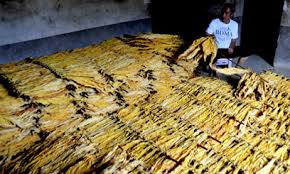Kenyans Are Better Off Abandoning Tobacco Farming — UoN report
A new survey confirms that tobacco farmers would make more money from other crops such as tomatoes.
According to the survey, which was conducted in part by the University of Nairobi, the government is to blame for not aggressively promoting alternative crops.
According to the Ministry of Agriculture, an estimated 55,000 farmers grow tobacco, primarily in Nyanza, Western, and pockets of Central and Eastern Kenya.
Farmers told researchers that they are trapped in a debt cycle but do not venture into other crops due to a lack of market.
The government is required by the Tobacco Control Act of 2007 to introduce alternative crops for tobacco farmers.
Tobacco cultivation has fallen out of favor due to the extremely high labor requirements that make it unprofitable.
It also necessitates a large amount of water, environmentally hazardous pesticides, and causes environmental degradation during the wood-fired curing process.
During leaf harvesting, farmers frequently suffer from acute nicotine poisoning, also known as “green tobacco sickness.”
According to the report, a tobacco farmer would earn Sh24,585 per acre in Busia and Sh36,200 per acre in Migori.
To illustrate the difference between tobacco and other crops, consider tomato, which yields profits ranging from Sh84,360 to Sh134,900 per acre.
Groundnuts yield Sh54,360 per acre, and maize yields between Sh35,450 and Sh76,760 per acre.
Pater Magati, an economist from the University of Nairobi who has previously conducted research on tobacco farming, participated in the study.

It is titled “Understanding Alternatives to Tobacco Production in Kenya.”
The other researchers are from McGill University, the University of Ottawa, and the American Cancer Society.
According to the report, the cost of inputs farmers receive on loans from leaf-buying companies is frequently exaggerated. So they keep growing the leaf and borrowing.
This is perpetuated by tobacco companies’ common practise of refusing to buy tobacco from farmers once their loans have been repaid. Also, the consistent downgrading of tobacco and the inflated cost of inputs.
Farmers and local government officials said that while alternative cops are more profitable, there is a lack of a guaranteed market, as well as a lack of oversight and direction from the government.
“For instance, data used to promote alternative crops are often based on hearsay and can even be influenced by (misleading) data from tobacco companies,” the report says.
The Kenya Tobacco Control Alliance, a health promotion lobby with a presence across the country, claims that farmers can profitably grow a wide range of alternative crops.
“These include cereals, tubers, and vegetables. They have all been proven to have higher returns,” Ketca chair Joel Gitali said.
He urged county and national governments to develop policies as well as aggressively promote non-tobacco crops to farmers.
In 2019, the American Cancer Society and the local non-profit International Institute for Legislative Affairs followed both farmers who were still growing tobacco and those who had stopped growing it.
When compared to tobacco farmers, the median non-tobacco farming household had roughly double the household resources.
The report, titled Economics of Tobacco Growing in Kenya, concluded that Kenyan tobacco farmers would be far better off shifting away from the crop.



Comments